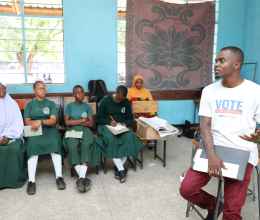(2/25/21) Prepared Remarks on SB 241 - Christopher Bruce
Prepared Remarks
Christopher Bruce - Political Director, ACLU of Georgia
Senate Ethics Committee
February 25, 2021, 7:30 a.m.

Good morning Chairman Burns and Members of the Ethics Committee. My name is Christopher Bruce, and I am the Political Director for the ACLU of Georgia. The ACLU of Georgia is a non-partisan organization dedicated to protecting the civil liberties of all Georgians; the right to vote is one of the most sacred civil liberties we have as Americans.
Georgia realized unprecedented voter turnout during the 2020 election cycle as millions of Georgians were able to safely and securely cast their ballots while a global pandemic plagued our state. But instead of helping more Georgians access the ballot, Senate Bill 241 creates significant barriers to the ballot box in Georgia. We urge this committee to table this legislation, which has the potential to disenfranchise hundreds of thousands of voters across our state.
First, this bill deeply harms the right to vote in Georgia by requiring Georgians to provide one of a narrow set of excuses in order to vote absentee by mail. Over 1.3 million Georgians voted by absentee ballot during the general election, as did 1.1 million during the runoff. Making absentee-by-mail voting available only to those who fulfill one of the 6 official criteria excludes eligible voters who, without absentee options, may not otherwise be able to cast a ballot. Lack of readily accessible transportation, the demands of a job, family emergencies, geographical challenges all limit one’s access to the polls. For Georgians contending with these hurdles, absentee voting is not just a convenience but a necessity. The bottom line is simple: during the 2020 General Election, nearly 30% of votes were cast via absentee by mail voting. If SB 241 were to pass, many of those Georgians would be barred from using their preferred voting method.
Georgians have been able to cast absentee ballots by mail, without having to provide an excuse, for over 15 years. This places Georgia amongst the supermajority of states in the nation (34 + DC) that allow their citizens to access no-excuse absentee by mail voting as a right.[1] Why do the voters of Georgia suddenly need a government permission slip in order to exercise their right to cast an absentee ballot?
Second, SB 241 creates an unnecessary hurdle by requiring voters to have a witness signature on their absentee ballot. The goal of this provision is to solve a problem that does not exist. An audit by the GBI of over 15,000 absentee ballots found exactly zero cases of fraud or voter impersonation. What then is the function of requiring a chaperone to vote absentee?
Barely any states require voters to have a witness signature in order to cast an absentee ballot.[2] And in those states (11 total) the measure has caused significant harm to voters and has done nothing to increase elections security. Wherever this misguided policy has been implemented, failure to include a witness signature is routinely a top reason that absentee ballots are rejected. [3]
This not only created a hurdle for voters; it also burdened counties and municipalities with the cost and labor of notifying voters of their ballot rejection. The burden is obvious. The benefit is not.
One state elections official captured it plainly last year during the pandemic, stating “That witness signature doesn’t do a lot for us, and it does a lot of harm to voters.”[4] This bill would have Georgia adopt what is clearly a worst practice in voting.
Third, on top of requiring a government permission slip and a chaperone to vote absentee, the bill continues its assault on absentee voting by creating a Kinko’s rule, requiring a photocopy of a personal ID with every single absentee ballot. Not only is this an extreme burden to place on Georgia voters, a large number of whom do not have a scanner/printer/copier at home, but this also creates a situation in which every single absentee ballot would contain sensitive personal information. If such a rule had applied to each absentee voter in Georgia, this past cycle, over 4 million photocopies of personal identification would have been floating around, needlessly.
42% of absentee voters in the general election and 47% of absentee voters in the runoff were age 66 and older. The rollover absentee list this past cycle reached nearly 600,000 voters, all of whom are Georgians who are either physically disabled, senior citizens, or both. When senior citizens and those who are disabled are more likely to be targeted for identity theft, to force all of these voters to make copies of their ID every time they vote absentee is not only incredibly burdensome, but also deeply dangerous policy.
These proposals to add massive hurdles to absentee balloting in Georgia fail to recognize that a global pandemic continues to affect communities all over Georgia and that absentee ballots, undoubtedly, saved lives this past election cycle. Instead of recognizing that absentee ballots kept voters safe while COVID-19 killed more than 15,000 of our fellow Georgians and half-a-million of our fellow Americans, this bill would force voters to risk their lives in order to cast their ballots, making it nearly impossible for Georgians to utilize the safest option to vote--absentee-by-mail.
The barriers imposed by this bill directly disenfranchise our most vulnerable citizens, and create overwhelming burdens for poll workers and voters alike. We strongly urge this committee to reject the bill as drafted.
Thank you. I yield for any questions.
[1] VOPP: Table 1: States with No-Excuse Absentee Voting
For domestic voters wishing to vote absentee or by mail, 16 states require voters to provide an “excuse” for why they will not be able to vote on Election Day. Some of these states do provide early in-person voting. The other 34 states and Washington, D.C., do not require an excuse from those who wish to vote absentee or by mail. Five states conduct elections entirely by mail (Colorado, Hawaii, Oregon, Utah and Washington), which means voters do not need to request a ballot, and instead automatically receive one. The other 29 states and D.C. offer “no-excuse” absentee voting, which means any voter can request a mail ballot without providing an excuse.
[2] VOPP: Table 14: How States Verify Voted Absentee Ballots
[3] With Black voters accounting for a disproportionate number of those rejections. Voters struggling with witness rules in early voting (apnews.com) Wisconsin rejected over 14,000 ballots in one primary election due to voters not having a witness signature on their ballot.
[4] South Carolina State Election Commission Spokesman Chris Whitmire; Voters struggling with witness rules in early voting, Associated Press, September 25, 2020
Related content
SB 101
January 29, 2024
Former ACLU of Ga. Fellow Creates Youth Leadership Program in Tanzania
May 17, 2023
Our Week at the Capitol: Opposing SB 140, a voting-related win, and...
March 17, 2023Press Release: With Many Still Awaiting Absentee Ballots, the ACLU...
November 4, 2022